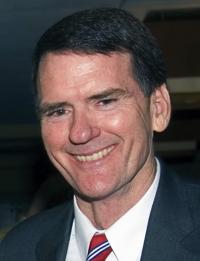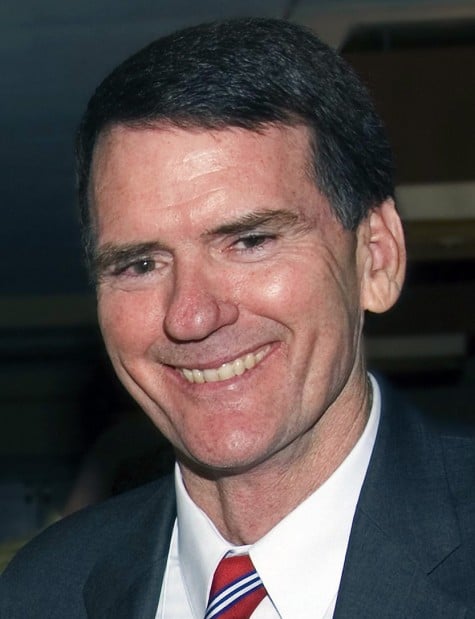U.S. District Judge John McCarthy Roll of Tucson was remembered Saturday by colleagues, lawyers and friends for his stern law-and-order style and dedication to the law.
Roll, chief judge of the U.S. District Court in Arizona, was among the six people slain at an event hosted by U.S. Rep. Gabrielle Giffords on the northwest side.
"He was a great guy. It's devastating to the courts and to me," said U.S. District Judge Frank Zapata. "We've been friends for 25 years, and he was a tremendous judge and a tremendous person."
Roll took his seat on the federal bench in 1991, appointed by President George H.W. Bush to the U.S. District Court after nomination by Sen. John McCain. He previously held a post in the Arizona Court of Appeals, Division II in Pima County.
Roll, a 1972 graduate of the University of Arizona College of Law, was at the Safeway at Ina and Oracle roads to see Giffords when he was shot in the mass shooting.
Flags at many federal courthouses will be lowered to half staff in memory of Roll, officials said.
Roll had a long and distinguished career in the law, first as a prosecutor and then as a judge. He recently wrote a letter to U.S. Court of Appeals Judge Alex Kozinski asking permission to delay felony trials because of the heavy caseloads Arizona federal judges are handling.
As a federal judge, Roll presided over numerous immigration and drug cases, but drew unwanted attention for presiding over a $32 million civil-rights lawsuit that illegal immigrants filed against an Arizona rancher. According to a 2009 story in The Arizona Republic, Roll and his family received death threats.
Roll and his wife were given a protective detail after the threats. At the time, Roll said, "I have a very strong belief that there is nothing wrong with criticizing a judicial decision. But when it comes to threats, that is an entirely different matter."
As a jurist, Roll was known as a conservative "but not a judicial activist," said defense attorney Saji Vettiyil, who said he appeared before Roll at least twice a month. "He ran his courtroom with the grandeur and dignity a federal courtroom deserves. He was a man of impeccable, impeccable legal ability and the most reputable judge you can ever know.
"You'd better be prepared if you were going to appear in front of Judge Roll," Vettiyil said. "Many people didn't know the human side. He was also a very, very compassionate human being. He was a genuinely nice human being, concerned about the people around him."
Former State Bar President Dee-Dee Samet, who was a friend of Roll's, said in a news release that "Judge John Roll was not just a great lawyer and respected judge, but he was a true friend and wonderful human being. I don't know of a kinder or more considerate person. My heart goes out to his wife, Maureen, and their family. I think Judge Roll would want us all to carry on, despite this horrific event, to serve our community and to not lose faith; that's just the type of person he was."
While Roll was well-known in his capacity as a federal judge, he was also a husband, father and man of strong Catholic faith, said Bishop Gerald F. Kicanas of the Roman Catholic Diocese of Tucson. Roll graduated from Salpointe Catholic High School.
"Judge Roll was a person of great faith and great integrity. He lived his faith as a devoted parishioner of SS. Peter and Paul Parish and St. Thomas the Apostle Parish in Tucson," Kicanas said in a written statement.
"For many years, he would begin his day serving the early-morning Mass at SS. Peter and Paul. He proclaimed the Word of God as a lector at SS. Peter and Paul and St. Thomas the Apostle. He lived his faith as a servant of our nation for the cause of justice."
Kicanas said all the Catholic bishops who are with him in the Holy Land are praying for the victims and their families.
"We share with each other the shock and the heartbreak of this tragedy," Kicanas wrote.
Sheriff Clarence Dupnik said Roll had just attended Mass and stopped by the Giffords' event before he was to head home.
Roll began his career as an assistant city attorney for Tucson, and in 1973 became a county prosecutor in Pima County. After seven years he moved to the U.S. Attorney's Office. In a 1980 profile, Roll said, "I try to be aggressive without being overbearing, and courteous, no matter how much the defense is getting on my nerves. The courtroom deserves that demeanor. I think what we're doing is just as serious as anything else that goes on in this world."
Roll received his master of laws degree in 1990 from the University of Virginia.
Fred Kay worked as a public defense attorney and worked opposite Roll when he was a prosecutor and also knew him as a judge. "He was a very serious guy who took his work very seriously and worked hard and was very thorough," he said. "I wouldn't describe him as a real funny guy or anything, but he could laugh and make fun of himself."
Roll's demeanor on the bench carried through to his reading of the law, Kay said. "He very strictly followed what he thought the statutes were. With sentencings, he wasn't going to give anyone a pat on the back - he wasn't unfair, but was certainly strict."
Roll was involved in high-profile cases. As a federal prosecutor he worked major drug-conspiracy cases developed by the Drug Enforcement Administration. He oversaw portions of the legal proceedings in the savings-and-loan scandal in the 1990s.
In 1994 Roll ruled that some requirements of the Brady Law, which requires background checks and a waiting period for people wanting to purchase a gun, are unconstitutional. Some of the provisions of the law that require law enforcement officers to conduct the background searches, Roll wrote, violate the 10th Amendment and the Fifth Amendment due process clause.
What might not be as well known is Roll's work with promoting democracy with emerging nations, said University of Arizona law Dean Lawrence Ponoroff.
He was involved with The William H. Rehnquist Center on the Constitutional Structures of Government and spent time working with people in former Eastern Bloc nations, helping them draft constitutions and offering advice to jurists.
"He cared deeply about people, number one, and number two, I believe he really loved this country, in part because of its way of life," Ponoroff said. "He was eager when there was an opportunity to see populations that had been oppressed for so many years, to have a chance to have the same opportunity."
He is survived by his wife, Maureen, and three sons.
Star reporters Stephanie Innes, Jane See White, Carmen Duarte, Tim Steller and Tony Davis contributed to this report.





